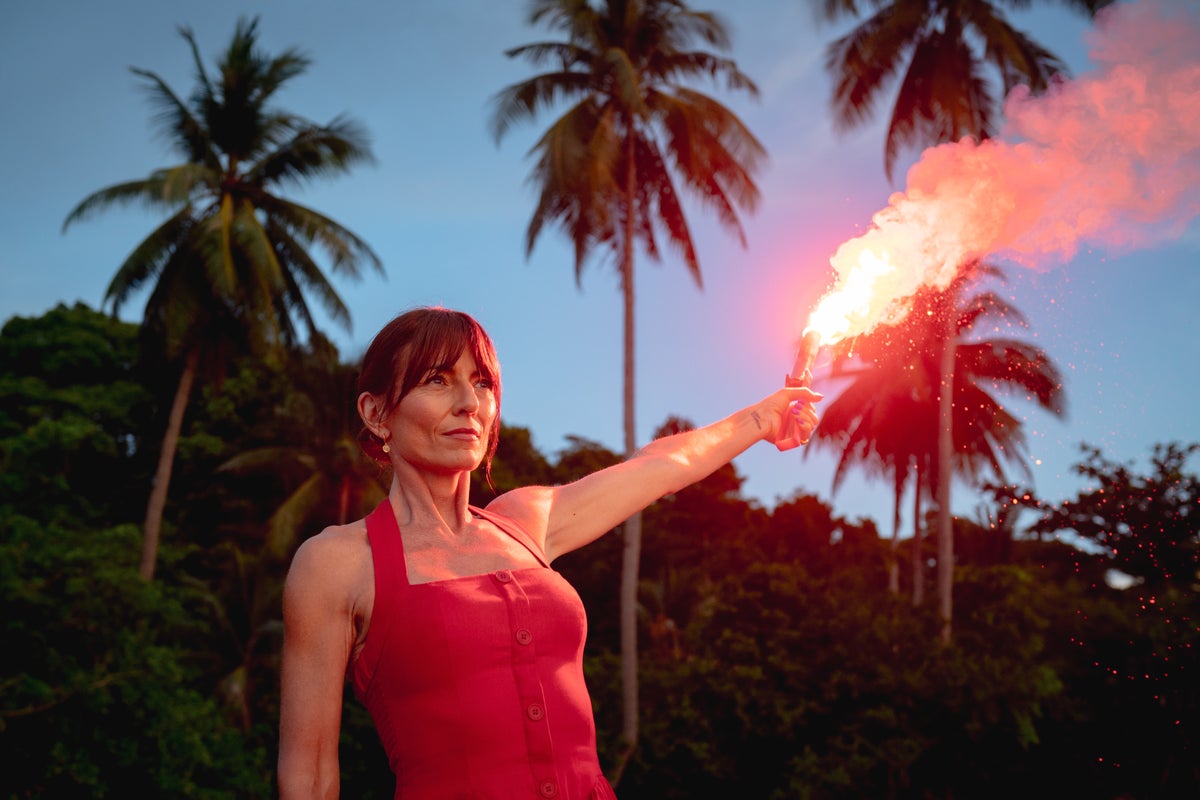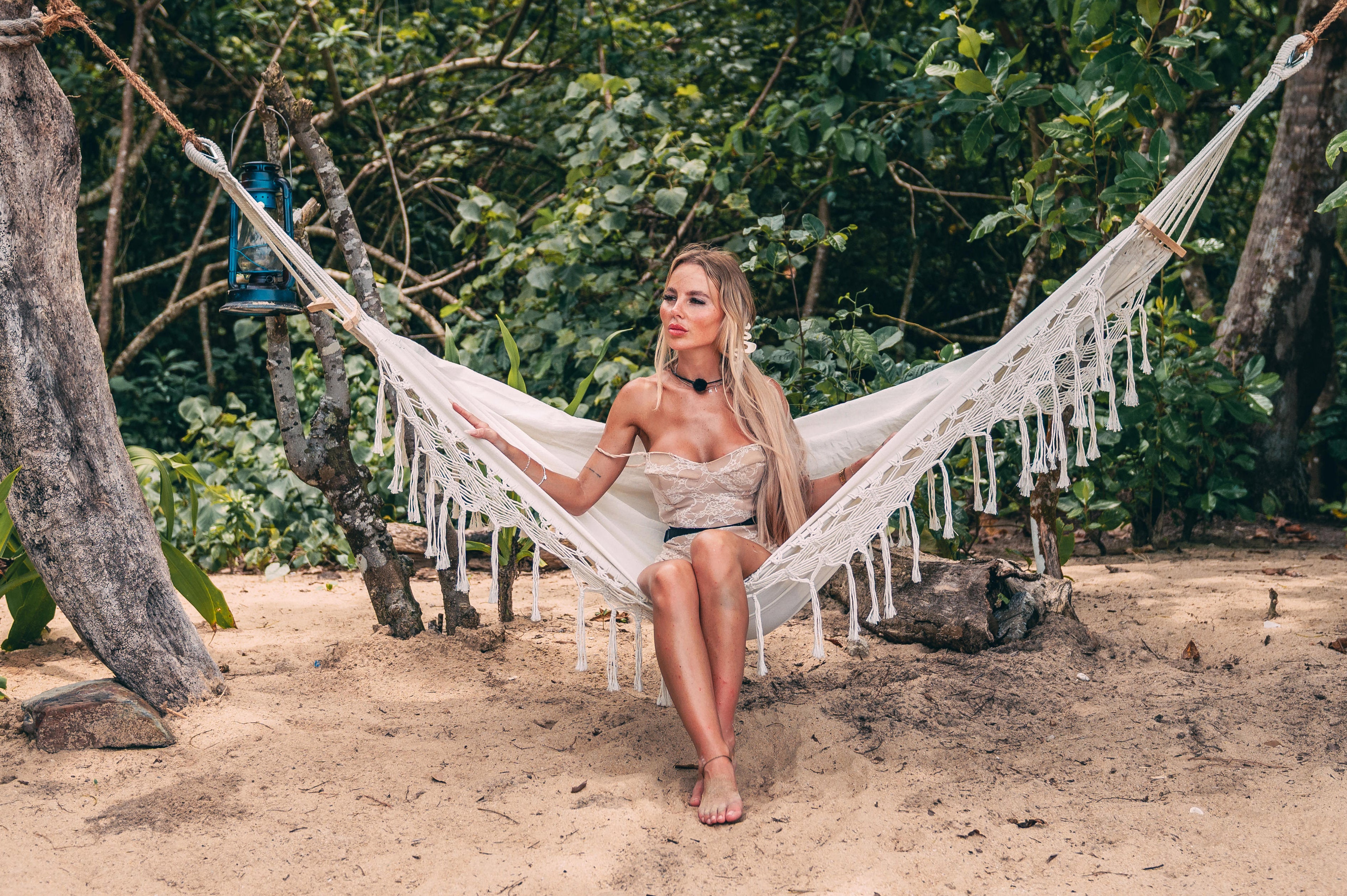
Here’s a new drinking game. Stick on any reality dating TV show made in the past five years, and take a shot each time any of the following occur: a contestant bemoans the savage online dating landscape, a host touts the benefits of “distraction-free dating” and soft Ibiza-style house music plays over panoramic shots of a tropical destination. Well, you’ll be as drunk as a 2015 Love Island contestant by the time you finish Stranded on Honeymoon Island, the BBC’s latest attempt at prodding the reality dating market, where six couples must survive on a Philippines beachfront without electricity, technology or a working toilet for three weeks. The question is: can you find love and thrive in a setting so removed from modern society?
Hosted by Davina McCall, Honeymoon Island is the oddball lovechild of Married at First Sight Australia and the US reality series Survivor (and Love Island is the haggard live-in auntie). As a reality dating fan feeling wearied by the cliquey beast that is the Netflix dating-verse, which pops out another samey show every few months, I had been excited by what seemed like a refreshing new concept from the BBC. Oh, how wrong I’d been. Honeymoon Island is completely predictable, and it’s only a testament to the unimaginative, repetitive, overcooked parameters that continue to plague dating shows.
On Honeymoon Island, each couple has a non-legally binding wedding ceremony, where hypothetical vows and first pecks are exchanged. So far, so MAFS. After the couples swim ashore – fully clothed – to the beachside shack they will call home for the next 21 days, they are thrown into Couples Cove (ahem, Love Island’s Casa Amor, anyone?), where relationships and temptations are tested by meeting other horny twentysomethings. And then there’s the oft-used phrases, such as “without distraction from the outside world” and “finding love against the odds”, which remind me of Netflix’s mammoth “social experiment” Love Is Blind, where singles date through a wall without contact with their friends or families. (In fact, when it comes to watching this programme, spotting concepts inspired by other dating series could be another drinking game entirely.)
I’m not saying that Honeymoon Island is the only series taking cues from its predecessors. The similarities between all these creations is likely a sign of the state of the TV industry more generally, where it’s safer for broadcasters and streamers to replicate a commercially foolproof format. Just look at how the success of the BBC’s deception gameshow The Traitors has led to a deluge of wannabe series, from Channel 4’s The Inheritance to BBC One’s Destination X.
Broadcasters can also vouch for the “no distraction” dating programme format – the narrative that contestants are so disappointed by the superficial state of modern dating that they will happily escape their real life to find love – because it panders to a particular cultural mood. It’s no secret that the dating scene in 2025 has a bad reputation, thanks to social media and dating apps that present infinite potential partners on a platter. Meeting new people has never been easier, but forging a real connection has never been more hellish. It’s no wonder that Honeymoon Island contestants will gladly strip themselves of their devices and vices to embark on a love story that doesn’t involve the words “Hinge” or “he slid into my Instagram DMs” in its retelling.

The rhetoric surrounding these shows, too, suggests that contestants want to escape surface-level dating. In Honeymoon Island, 30-year-old recruitment consultant Mae tells the camera that she worries about living without her skincare routine, her “anti-wrinkle straw” and LED face mask, but you also get the feeling that she wants someone to fall for her at her most natural. In the second season of Love Is Blind UK, released last month, contestants were unanimous that they wanted to stop being judged by their looks, or judging others by theirs, and they prioritised topics like family, religion and lifestyle in their pod chatter. Essentially, the idea is that these shows will succeed by presenting an alternative to a life of endless swiping. The irony is, though, that in repeatedly pursuing this concept, each show has fallen into the trap of becoming as repetitive and boring as the very apps they’re trying to help us escape from.
And surely there are more original ways of presenting a different take on dating. Take the brilliant My Mum, Your Dad, also hosted by McCall, on ITV1. When it arrived in 2023, I lapped it up – it was the most heartening dating show I’d watched in ages, following a group of single parents (many of them actually normal-looking!) searching for love as their adult children watch from a surveillance bunker. It was joyful, moving and enlightening. These were people navigating knotty, grown-up, complicated life, not the question of whether they’d be able to survive without their anti-wrinkle straw.
What would really restore some much-needed hope in the modern dating landscape is more shows like My Mum, Your Dad, rather than another “MAFS, but make it tropical”.
Until then, when it comes to my own relationship with reality dating shows, I think it’s time for us to go on a break.







